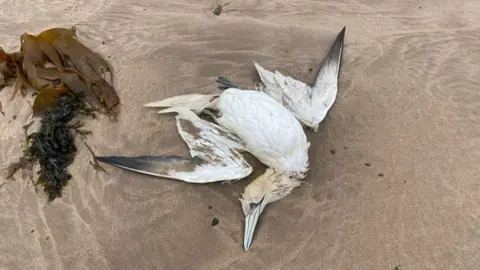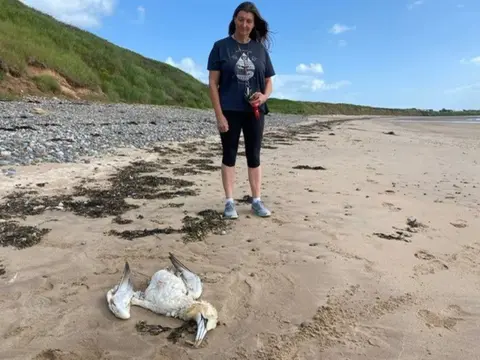Warning not to touch dead seabirds on Northumberland and Teesside coastlines
 BBC
BBCPeople have been told not to touch or allow their dogs go near any dead or sick seabirds they find along the North East coastline.
More gannets, razorbills and guillemots have been found washed up at Seaton point, near Boulmer in Northumberland, and Seaton Carew beach in Hartlepool.
Some of the seabirds found on Teesside have been collected by the Animal and Plant Health Agency (APHA).
They will be examined as part of its wild bird surveillance survey.
Tony Hanson, Hartlepool Borough Council's director of neighbourhoods, said: "Not all dead birds will be collected for the purpose of the survey, however any remaining dead birds will be disposed of by the council.
"We would ask people to please don't touch or pick up any dead or visibly sick birds and to keep their dogs away from them as well."
The latest finds follow a spate of seabird carcasses washed up along the North East coast a week ago.
It is feared the deaths could be linked to an outbreak of avian flu across Scotland which has seen hundreds of birds killed.
The virus is extremely contagious among birds, and the public is being asked to keep away from any dead or ill birds to help prevent the spread of disease.

Jane Hardy, who works for the charity British Divers Marine Life Rescue (BDMLR) in Northumberland, first heard reports of sick gannets a week ago.
She is concerned about the consequences if the virus hits the Bass Rock, in the Firth of Forth, which is home to more than 150,000 gannets at the peak of the season.
Ms Hardy said: "It's soul destroying and heart breaking to see this, what happens if their colony is affected, do they disappear forever? Is it avian flu or something else?
"We're so lucky to have these birds with piercing blue eyes who dive through the water at 60mph and if it's avian flu it doesn't bear thinking about what might happen to them."
The National Trust, which looks after a number of important colonies of seabirds along the coast, said: "While the cause of these deaths on the Northumberland coast is not yet clear, we are supporting government efforts to contain and monitor avian flu that has been prevalent across the country since the winter."
The Department for Environment, Food and Rural Affairs said it was aware of a number of wild bird deaths in several locations in England and they were currently under investigation as part of APHA's bird surveillance programme.
The APHA said the programme involved the testing of some of the dead seabirds to find out how avian flu was being "distributed geographically".

Follow BBC North East & Cumbria on Twitter, Facebook and Instagram. Send your story ideas to [email protected].
